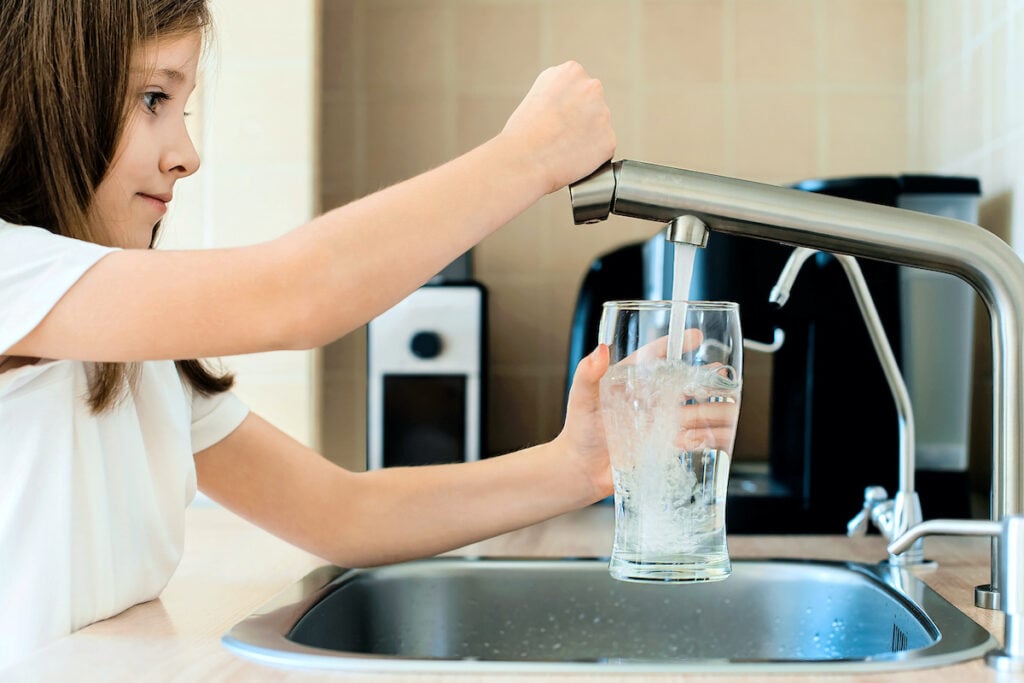Why is a Home Water Filtration System Important?
Many of us take water for granted and don’t pay much attention to its quality. We know water flows into our homes, and we use it every day. But why, beyond just taste and ease, is a home water filtration system so important?

The quality of unfiltered water is often overlooked, and bottled water is not the solution. A home filtration system is one of the only ways to avoid several harmful contaminants found in the water supply.
It would be nice if the water that comes into your home was perfect, but that’s not the case. According to the Environmental Working Group’s report on tap water, your water could be contaminated with heavy metals, Chromium-6, cleaning agents like chlorine, or some 300 other chemicals and pollutants.
The EWG also reports, “Compared to adults, children drink more water per pound of body weight, resulting in greater exposure and greater risk. They’re also more vulnerable to harmful contaminants because their bodies are still growing and toxic chemicals cause more harm to developing organs and tissues.”
To check what’s in your tap water, enter your zip code at this water quality database.
Bottled Water Isn’t the Solution
Bottled water may seem like a logical way to avoid the contaminants found in tap water. But it’s not.
One of the chemical additives used to “improve the taste” of Dasani’s bottled tap water is used in lethal injections. Another ingredient is known to cause birth defects.
Dasani (CocaCola) and Aquafina (Pepsi) have been forced to admit their branded bottles are filled with tap water. Dasani also contains magnesium sulfate, also known as Epsom salt (a laxative and a drying agent) and also a known teratogen (can disturb the development of an embryo or fetus). It also contains Potassium Chloride (a commonly used fertilizer which is also used in lethal injections).
Bottled water is also a major problem for the environment. The production of plastic water bottles requires up to 17 million barrels of oil each year. Each single use plastic bottle can take up to one thousand years to decompose, leaking dangerous and harmful chemicals during the process. Certain leaked toxins can lead to cancer and reproductive disabilities.
The argument of “but I recycle my water bottles” isn’t very convincing since only a small percentage of our plastic waste is actually getting recycled. (source)
Why is a Home Water Filtration System Important?
Here’s why you’d want to consider filtering your water at home.
For Healthier, Plastic-Free Drinking Water
One important reason you’ll want a filtration system at home is so that everyone can drink safely. You’ll have peace of mind knowing that your family won’t be drinking water, tea, or coffee with harmful contaminants.
The same goes for ice. If your ice was made with contaminated water, it will melt into your drink.
For Safer Cooking
It’s easy to forget that the water we consume throughout the day doesn’t always come from a glass. Our food should keep us hydrated as well. If you buy organic food, it’s counterintuitive to steam or cook it with chemical-infused water.
For Healthier Skin & Hair
Repeated exposure to water that might have heavy metals or some other type of contaminant isn’t ideal for your skin or hair. Some people with sensitive skin can experience irritation or rashes. Installing a good and safe water filtration system for your home can have enormous benefits for your overall health.
To Save Money
If you’ve been buying bottled water, you’re definitely overspending. And as we covered above, bottled water is not a healthier alternative.
Choosing a Home Water Filtration System
After a decade of using filter pitchers, we decided to switch to the BOROUX system. We were looking for an option that removed more contaminants and had filters that lasted longer than the ones we kept throwing away (because no one locally would recycle them) from our pitchers.
Because of the concerns with fluoride in drinking water, we chose to add the fluoride filters to our system.
BOROUX water filters are designed to effectively eliminate a wide range of contaminants commonly found in tap water, including:
- Chlorine and Chloramines: These chemicals, often used in municipal water treatment, can affect the taste and safety of water. BOROUX filters remove them, making the water more pleasant to drink.
- Heavy Metals: The filters remove harmful metals such as lead, mercury, and cadmium, which can have adverse health effects.
- Organic Compounds and Pesticides: BOROUX filters reduce organic pollutants and pesticide residues for non-toxic water.
BOROUX Water Filters helps you make sure your family is drinking pure, clean water- not heavy metals, pharmaceuticals, microplastics, PFAS, BPA, and more. These water filters integrate with most gravity-fed water filtration systems. You can get 20% with code GREENCHILD.
Here are some other situations where a home water filtration system can be necessary.
- Your home uses well water or a cistern
- You collect rainwater for consumption
- Your city water quality is questionable
- You experience frequent boil water advisories
- You live in an area with known lead issues in the water
- You spend money on bottled water
- You need a source of safe water during a storm or power outage
Because drinking clean water is vital for your health, having a reliable water filter or a source of safe, clean water should be high on your natural living priority list.
More Safe Drinking Resources
Chromium-6 in Tap Water
Fluoride and Children’s IQs
Plastic in Tea Bags (and the brands that don’t contain it)
How to Avoid PFAS in Tea Bags
A Hard Look at Water Softener Safety
Water Conservation Tips
